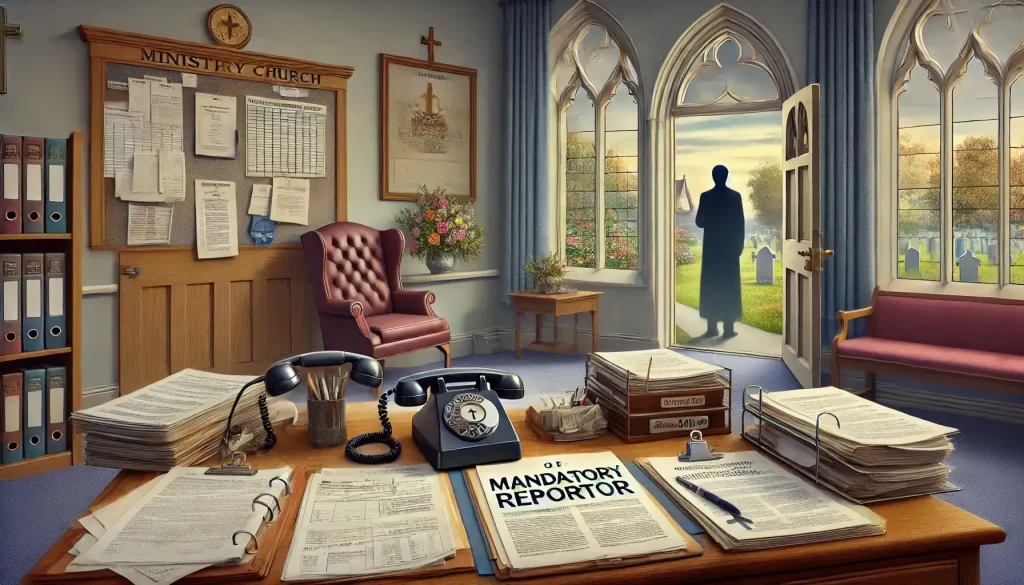
National Association of Christian Ministers Manual to Ministry: Planning
As Christian ministers, our calling is to shepherd and protect the flock entrusted to our care. This sacred duty extends beyond spiritual guidance to ensuring the physical and emotional well-being of our congregation, particularly the most vulnerable among us: children, the elderly, and those unable to protect themselves. One critical aspect of this responsibility is understanding and fulfilling the role of a mandatory reporter.
Understanding the Role of a Mandatory Reporter #
A mandatory reporter is an individual required by law to report any suspicion of child abuse, neglect, or exploitation. This legal obligation aims to protect those who cannot protect themselves and to ensure timely intervention by authorities. For ministers, this role can sometimes feel at odds with pastoral confidentiality, but the imperative to protect the vulnerable must take precedence.
Legal Requirements #
In the United States, mandatory reporting laws vary by state, but they commonly require reporting when there is a reasonable suspicion of abuse or neglect. Failure to report can result in legal consequences, including fines and imprisonment. For ministers, the legal requirements typically include:
-
- Reasonable Suspicion: You are not required to have proof, but if you suspect abuse based on what you see, hear, or are told, you must report it.
- Immediate Reporting: Reports should be made as soon as possible, typically within 24-48 hours of suspicion.
- Confidentiality: The identity of the reporter is usually kept confidential to encourage reporting and protect the reporter from retaliation.
Confessions of sins are not protected from the legal requirement to report abuse. The best way to handle such matters is by beginning the right way. Begin all conversations by asking if the information being spoken is “confidential.” If they answer “yes,” then is the time to explain that you have a legal obligation to report suspected abuse and neglect.
How to Report #
Each state has a specific process for reporting, often involving a hotline or online form. Familiarize yourself with your state’s procedures, which typically include:
-
- Hotline: A dedicated phone line for reporting suspected abuse.
- Online Forms: Many states offer online systems for submitting reports.
- Local Authorities: Reports can also be made directly to local child protective services or law enforcement agencies.
Ethical and Pastoral Considerations #
Balancing your legal obligations with your pastoral duties can be challenging. Here are some considerations to guide you:
-
- Protecting the Vulnerable: Your primary responsibility is to protect those at risk. Reporting suspected abuse can prevent further harm and initiate the necessary interventions.
- Confidentiality and Trust: While pastoral confidentiality is important, it does not extend to situations where abuse is suspected. Clearly communicate this limitation to your congregation, emphasizing that your duty to protect them takes precedence.
- Support and Healing: Offer support to the victim and their family throughout the reporting process. Provide pastoral care and connect them with counseling and other resources as needed.
Practical Steps for Ministers #
Education and Training #
Equip yourself and your church staff with the knowledge and skills needed to identify and respond to abuse. This can be done through:
-
- Workshops and Seminars: Attend or host training sessions on recognizing and reporting abuse.
- Resources: Utilize books, articles, and online resources to stay informed about mandatory reporting laws and best practices.
Creating a Safe Environment #
Foster an environment where children and vulnerable adults feel safe and protected. Implement policies and practices such as:
-
- Background Checks: Conduct thorough background checks on all church staff and volunteers who work with children or vulnerable adults.
- Clear Policies: Develop and enforce policies regarding appropriate conduct, reporting procedures, and response plans for suspected abuse.
- Education Programs: Educate your congregation about the signs of abuse and the importance of reporting.
Compassionate Response #
When faced with a situation requiring reporting, handle it with care and compassion:
-
- Listen and Believe: Take any disclosure of abuse seriously. Listen without judgment and believe the victim.
- Report Promptly: Follow your state’s reporting requirements without delay.
- Provide Ongoing Support: Continue to offer pastoral care and support to the victim and their family. Connect them with professional counseling and other necessary resources.
Conclusion #
As Christian ministers, our role as mandatory reporters is a profound responsibility that aligns with our calling to protect and care for our congregation. By understanding our legal obligations, balancing ethical considerations, and taking practical steps to create a safe environment, we can fulfill this role with integrity and compassion. Remember, protecting the vulnerable is not just a legal duty but a moral imperative rooted in our faith. Let us strive to be vigilant shepherds, ensuring the safety and well-being of those we serve.
For further information and resources, consider reaching out to local child protective services, legal advisors, and organizations specializing in abuse prevention and reporting. Together, we can create a safer, more nurturing community for all.




